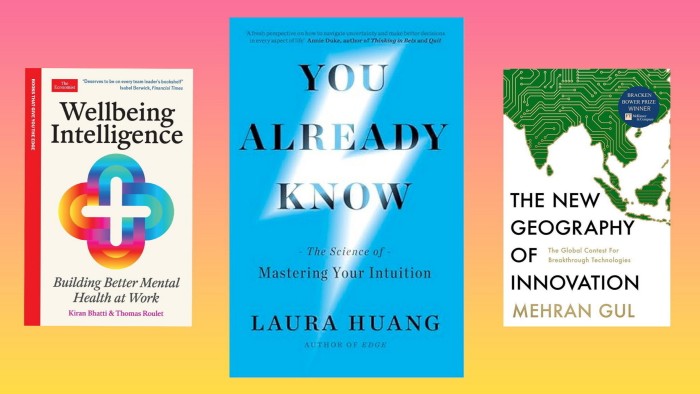Unlock the Editor’s Digest for free
Roula Khalaf, Editor of the FT, selects her favourite stories in this weekly newsletter.
‘The New Geography of Innovation’, by Mehran Gul
The US has created most of the technologies that define our age: personal computers, smartphones, search engines and social networks. In his sprightly written and anecdote-rich book exploring tech hotspots around the world, Mehran Gul sets out to answer the question: is that now changing?
Anyone familiar with Betteridge’s law of headlines may not be surprised by the answer: No. With the partial exception of China, Gul argues that the US still out-innovates the rest of the world and has been strengthening its economic dominance. In 1990 the US accounted for 39 per cent of the GDP of the G7 nations. Today it stands at 57 per cent. It’s “hard to avoid the conclusion that predictions of American decline, at least in the realm of new technologies, are vastly exaggerated,” Gul concludes.
The reader senses that this was not the answer Gul was hoping for when he set out on his world tour. But credit to the author for following the evidence. Interviewing 200 entrepreneurs, investors and policymakers around the world, he highlights the strengths and weaknesses of the US, China, the UK, Korea, Singapore, Germany and Canada. He acknowledges that he focuses predominantly on big tech companies rather than broader market innovation. Had he expanded his focus he might have come to slightly different conclusions, as argued in another recent book on east Asian innovation: Startup Capitalism by Robyn Klingler-Vidra and Ramon Pacheco Pardo.
But when it comes to building world-beating tech champions, Gul is surely right to say: “The Americans are not in a different league. They’re playing a different game.” John Thornhill
‘Wellbeing Intelligence: Building Better Mental Health at Work’, by Kiran Bhatti and Thomas Roulet
Mental health is now central to workplace discussions. For a clear, practical and compassionate approach to the issue, readers can do worse than looking to Wellbeing Intelligence. Rather than diagnosing the problem, Kiran Bhatti and Thomas Roulet focus on solutions, introducing “wellbeing intelligence” (WBQ), a learnable skillset for identifying and improving mental health at work.
The authors, a psychologist and a business school professor, structure the book around three concentric “circles”: the self, colleagues and the wider organisation. They draw on research and personal experience to show how wellbeing issues manifest, and how managers and employees can respond with care and skill.
Case studies — from a teacher frozen by burnout to a manager navigating a colleague’s anxiety — bring workplace realities to life. The stories are paired with practical tools, including the PHQ-9, a widely used nine-question checklist for identifying symptoms of depression, and the ARC model (Acknowledge, Respond, Change), a simple yet effective framework for guiding sensitive mental health conversations. These resources are accessible without oversimplifying complex issues.
What sets the book apart is its refusal to settle for slogans. Bhatti and Roulet argue that resilience should not mean tolerating poor systems, and that mental health support must go beyond HR initiatives. They argue convincingly that wellbeing cannot be outsourced and it must be embedded in organisational culture as well as strategy.
If there is a limitation, it is the optimistic tone when it comes to implementing systemic change, especially in under-resourced organisations. Still, Wellbeing Intelligence stands out as a timely guide that equips readers with both insight and actionable tools to make the workplace more human. Leo Cremonezi
‘You Already Know: The Science of Mastering Your Intuition’, by Laura Huang
When faced with a difficult business decision, do you already know what to do?
The answer might be yes. Laura Huang, a professor of management and organisational dynamics, urges us to pay attention to that nagging feeling that a prospective hire might not be quite right, or a seemingly risky investment is actually the next big thing
Core to Huang’s approach is the idea of intentional intuition: not just acting on instinct, but interrogating uneasy feelings when they arise and drawing on past experiences to challenge why you feel that way. Gut feeling, she says, might not be in the ‘gut’, but somewhere else you feel a physical reaction to an impulse that something is, or isn’t, quite right. Sometimes it’s below the stomach, sometimes in the neck or shoulders.
The book is peppered with examples of business leaders and titans of industry who have followed their instincts to success. Some, though, are less an endorsement for going with your gut, than an illustration that treating your labour force with respect and dignity might provide better business outcomes. We learn, for example, of the industry-wide changes that followed former Anglo-American CEO Cynthia Carroll’s decision to halt operations and reduce fatalities at its multimillion-dollar platinum mining operations in South Africa.
The book meanders into self-help territory in places. Even the cover evokes Eckhart Tolle’s The Power of Now, the wildly popular “guide to spiritual enlightenment”. Huang incorporates exercises at the end of some chapters to challenge your innate reaction to hypothetical situations, but these can be difficult to follow and the overall benefit of completing them is sometimes difficult to grasp.
Ignore the too-frequent footnotes: they disrupt the flow and feel like a know-it-all narrator whispering asides while sitting at your elbow. Ultimately, the book serves as a reminder to pay attention to your emotions, and avoid the grifters. Kimberley Long




